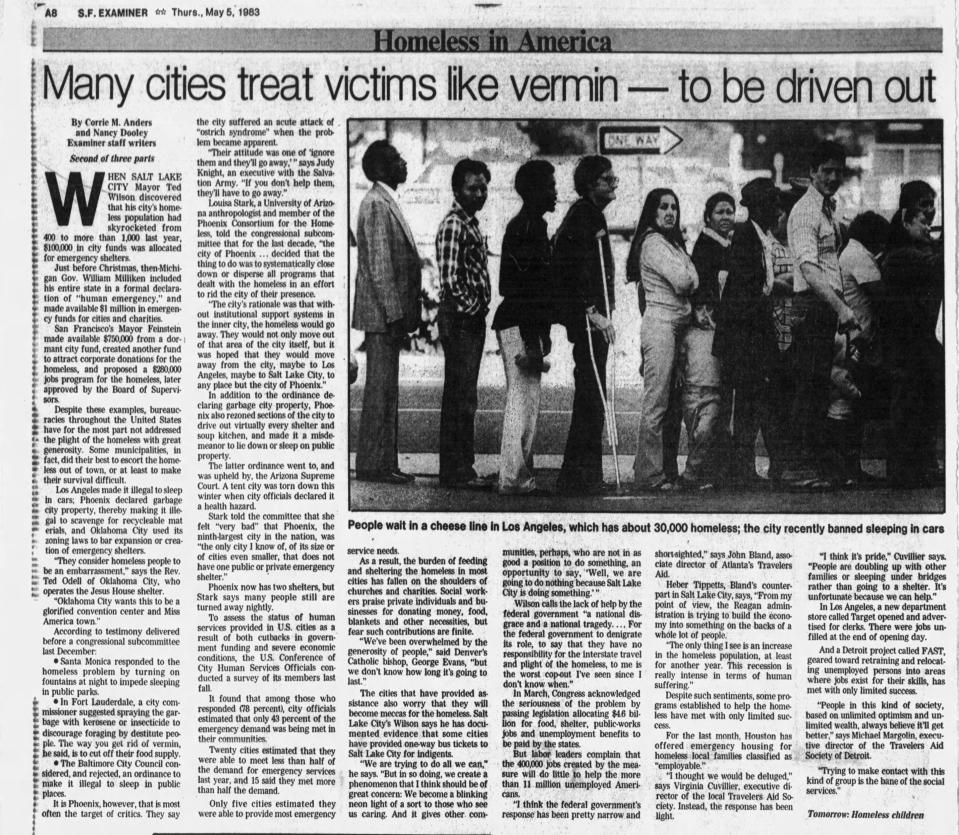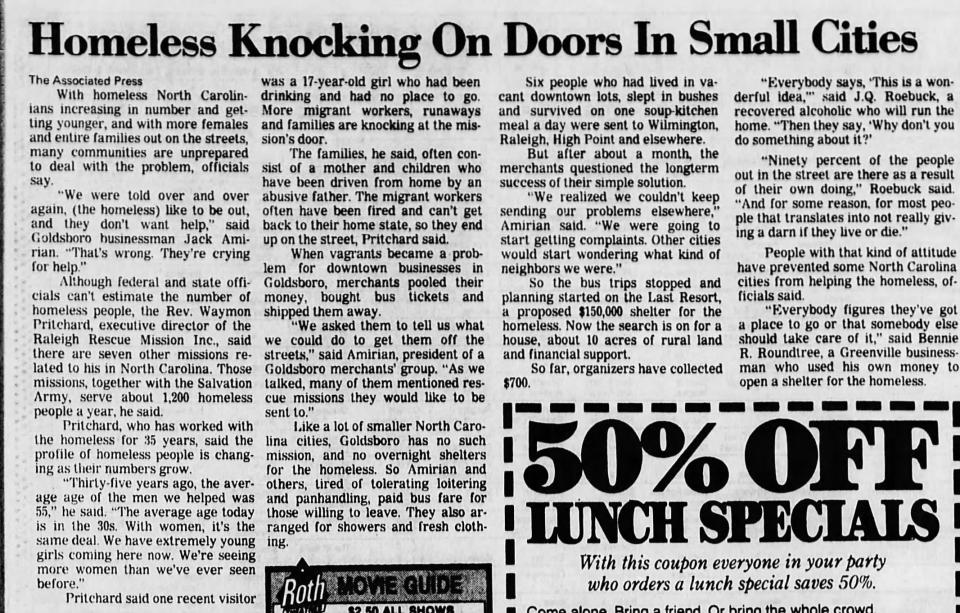From the Buncombe County archives: Where did the busing story originate and when?
ASHEVILLE - As many people in homeless services will note, they have been hearing the "busing rumor" for much of their career ― that another city, charity group or otherwise, is busing unhoused people into, say, Asheville from elsewhere.
A look into the Buncombe County Special Collections shows that similar stories have been around for decades, widely circulating in the mainstream by the late 1980s, the subject of countless articles and even a "20/20" episode in 1986.
Main story:Fact checking the Asheville busing myth: Are homeless people being bused into the city?
Carissa Pfeiffer, a library specialist with special collections, said rumors seem to derive from misperceptions about programs that are aimed at reducing homelessness, like New York City's Special One-Time Assistance (SOTA) and Project Reconnect programs, San Francisco's Homeward Bound travel assistance, Greyhound's Travelers Aid program, Home Free, etc.
More:Ending homelessness begins with restructuring the Asheville, Buncombe system, says report
More:As in-person visits lag since COVID, Buncombe libraries look to community outreach
Emily Ball, the city's homeless services system lead, said though Asheville organizations sometimes employ similar "diversion" tactics, such as reconnecting unhoused people with friends and family in other communities who can provide support, it "shouldn't be confused with irresponsibly busing people to other communities where they'll continue to be homeless."
Though Pfeiffer said she could not find direct evidence of when the story began to circulate in Asheville, the earliest mention in print she could find through Newspapers.com archives is a 1983 clipping that claimed to have "documented evidence that some cities have provided one-way bus tickets" sending homeless people en masse to other cities, in this case, Salt Lake City.
Here's a look at other 'busing' clippings:
1983: An article titled "Many Cities treat victims like vermin — to be driven out" ran May 5, 1983 in the San Francisco Examiner. It details strategies undertaken to "escort the homeless out of town, or at least to make their survival difficult." It includes a quote from Salt Lake City's mayor Ted Wilson that says, "he has documented evidence that some cities have provided one-way bus tickets to Salt Lake City for indigents."

1986: A "20/20" episode aired on the topic. TV Guide description (Jan. 4, 1986 in the Asheville Citizen Times): "(A) report on the way some communities deal with homeless vagrants and former mental patients: bus tickets to a destination of their choice."

Nov. 4, 1986. The Citizen Times ran an Associated Press story, "Homeless knocking on doors in small cities." It includes the detail: "When vagrants became a problem for downtown businesses in Goldsboro, merchants pooled their money, bought bus tickets and shipped them away." Later, it mentions that this effort impacted six people, who were sent to "Wilmington, Raleigh, High Point and elsewhere."

1996: Atlanta's Homeward Bound Program became international news when it was perceived to be part of the city's attempt to 'purge' Atlanta of unhoused people before the Olympics, said Pfeiffer. The controversy is detailed in this 2016 article from WBUR, "The Olympic Juggernaut: Displacing the poor from Atlanta to Rio."
Pip Flickinger, a mutual aid volunteer in Asheville, said they've been hearing versions of the busing rumors for years. It's one they feel was at least partially driven by the narrative that surrounded the 1996 Atlanta Olympics.
Despite the persistence of the rumors, Flickinger said in all their years of outreach, including their job since 2015 with Homeward Bound, a local nonprofit that works with the homeless population providing service and support, and their time managing the daytime shelter program AHOPE program for about two years, they have "never talked to a person who was bused here."
“Everywhere. It’s everywhere," Flickinger said of the rumors, adding that no data or anecdotes they know of point to there being a concerted, organized bussing effort pulling people into Asheville.
Flickinger is among the individuals charged by the Asheville Police Department with felony littering following protests in Aston Park in December 2021.
“I don’t know if it’s just easier to other people," Flickinger said of the busing narrative, "or easier to suggest crackdown policies when they’re not local, when they’re not the people we’re supposed to be looking out for.”
Sarah Honosky is the city government reporter for the Asheville Citizen Times, part of the USA TODAY Network. News Tips? Email shonosky@citizentimes.com or message on Twitter at @slhonosky.
This article originally appeared on Asheville Citizen Times: Archives: Where did the Asheville busing rumors originate and when?

